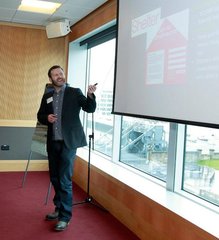
 In this blog Anna Visser and Eugene Flynn interrogate the fundraising/advocacy link and pose that donor relationships are the key. Drawing on international and Irish practice they address the limits and possibility of individual supporters and donors financing advocacy activity.
In this blog Anna Visser and Eugene Flynn interrogate the fundraising/advocacy link and pose that donor relationships are the key. Drawing on international and Irish practice they address the limits and possibility of individual supporters and donors financing advocacy activity.
In preparing a recent presentation for the Fundraising Ireland national conference , we conducted a mini survey on the links between fundraising and advocacy in Ireland today.
Of the ten responses (we did say mini!) a third were fundraisers, a third were advocates, while the remaining were responsible for both functions in their organisations. Half suggested that their organisations currently link fundraising and advocacy, while 90% saw themselves strengthening this link in the future. Examples include Trocaire’s Lent climate change campaign and last year’s schoolbooks campaign by St. Vincent de Paul.

The idea behind these initiatives is to get donors to support campaigning activities, or to convert campaigners into donors. International evidence suggests that campaigners are seven times more likely to donate than those who have not taken action for your organisations (National Bureau of Economic Research, 2009), and in the US at least there is a growing number of activists who make donations to their chosen cause.
On the flip side, donors are more than twice as likely to take action for an organisation than non-donors (National Bureau of Economic Research, 2009). In addition if an organisation asks someone to take action for them they are more likely to take an advocacy action than to make a donation ( M+R Benchmarks study 2012 ). Consequently advocacy is an invaluable way to build and maintain relationships with supporters and potential supporters.
So why then is there such a big dilemma about how to fund advocacy? Surely we can just stick a credit card form on the end of a petition and the future of advocacy is safe? Unfortunately it is not that simple. There are good reasons why there is hesitancy in building these connections. Our survey flagged a number of tensions between advocacy and fundraising.
In the first instance there is a concern that advocacy will put donors off as they prefer to support services. Donors may be reluctant to donate if they perceive an organisation to be ‘wasting’ resources on talking to politicians.
There was also concern that fundraising messages can undermine advocacy ambitions. A poster of a ‘poor’ child may well raise revenue, but it could also reinforce stereotypes about poverty. In addition a fundraiser may develop a relationship with a corporate donor that makes an advocate feel queasy. A more practical reluctance is that organisations are reluctant to contact supporters too frequently. Maintaining relationships and avoiding being ‘marked as junk’ are critical survival strategies.
These concerns are undoubtedly real, but are they exaggerated, or perhaps manageable? International evidence and the limited practice in Ireland demonstrates the potential of the link between fundraising and advocacy. But what would help manage the risks?
In our presentation we identified a number of ‘foundations’. First and foremost you need a good advocacy campaign with a clear message. One that fits an organisation’s mission, and is preferably achievable! Leadership buy-in is critical along with ownership as without it will be difficult to put in place the collaborative structures between fundraising and advocacy. Both sides know their audience and the messages need to be tailored to accommodate both objectives.
Smaller organisations without a traditional structure might have an advantage in this regard, and a single database helps. If you can view your contacts with both their action and donation histories it is easy to monitor successes. Integrating advocacy and fundraising may not always work, or necessarily be in the best interests of your mission, but making that call will require some capacity building and know how - chances are most of it already exists.
We are not suggesting that linking fundraising and advocacy is the solution to the funding dilemma facing many advocacy organisations, far from it. There remains a critical role for a variety of funding source, including the state and philanthropy, but it might help.
Before joining The Advocacy Initiative as Director, Anna Visser was Director of the European Anti-Poverty Network (EAPN) Ireland. She has over ten years’ experience in policy and development roles in the statutory and NGO.
Eugene Flynn is Founder and Director of 54 Degrees which specialises in delivering web solutions for non-profits and socially responsible businesses.
